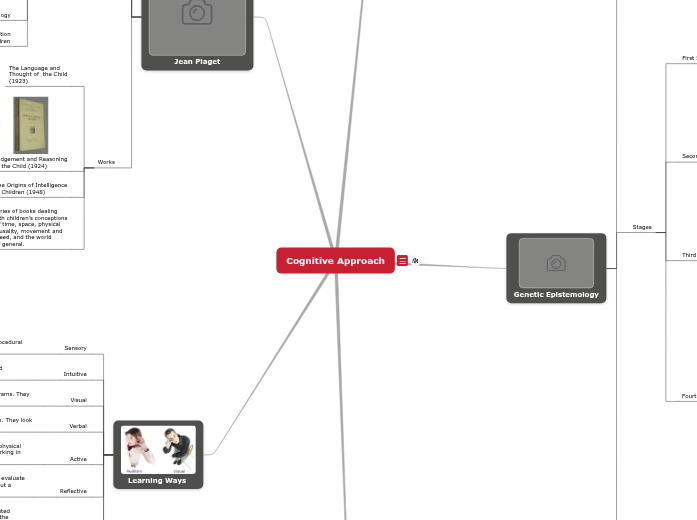jonka Daniela Barraza 14 vuotta sitten
782
Cognitive Approach

jonka Daniela Barraza 14 vuotta sitten
782

Lisää tämän kaltaisia
"Learning Styles." Mind Tools. Consulted the 17 of Octover of 2011. <http://www.mindtools.com/mnemlsty.html>
"cognitive psychology." Encyclopædia Britannica. Encyclopædia Britannica Online Academic Edition. Encyclopædia Britannica, 2011. Web. 13 Oct. 2011. <http://0-www.britannica.com.millenium.itesm.mx/EBchecked/topic/1246882/cognitive-psychology>.
"Jean Piaget." Encyclopædia Britannica. Encyclopædia Britannica Online Academic Edition. Encyclopædia Britannica, 2011. Web. 13 Oct. 2011. <http://0-www.britannica.com.millenium.itesm.mx/EBchecked/topic/459096/Jean-Piaget>.
"child development." Encyclopædia Britannica. Encyclopædia Britannica Online Academic Edition. Encyclopædia Britannica, 2011. Web. 13 Oct. 2011. <http://0-www.britannica.com.millenium.itesm.mx/EBchecked/topic/111044/child-development>.
Integrating simpler concepts into more complex ones at at each stage
Creating and recreating his model of reality
Explored their rasoning process
Logical processes of adults
Puberty
Physical and emotional changes
Sex-role identity
Based in gender
By age of 3
Identity
Empathy
Moral sense
Come at 7 to 12 years old
Mastery of complex rules of grammar and meaning
Use adult-like sentences
Small sentences
Start to understand grammar and syntax
Use of words in combination
Continually growing vocabulary
See the implications of their thinking and that of others
Make hypothesis
Manipulate abstract ideas
More flexible kind of mental experimentaion
Mastering of logical thought
Orderliness of thinking
12-Adulthood
Formal Operations
Concepts of time and number
Classification by similarities and differences
Beginnigs of logic in the thought process
7-11 or 12
Concrete Operational
Represent objects by words
Manipulate them mentally
Manipulate the the enviroment though thought
2-6 or 7 years old
Preoperational
Objects are a separate and permanent
Aware of himself as an individual
Mastering physical reflexes
0-2 years old
Sensimotor Stage
Human mind is the equivalent of a complex computer system
contruction of mental models of the world
representional thought
Jean Piaget
Search for the definition of cognition and learning ways
Information processing
A structure, configuration, or pattern of physical, biological, or psychological phenomena so integrated as to constitute a functional unit with properties not derivable by summation of its parts.
Gestalt Psychology
In the Berlin School is a theory of mind and brain positing; the operational principle of Gestalt is that the brain is holistic, parallel, and analog, with self-organizing tendencies
Invariance is the property of perception whereby simple geometrical objects are recognized independent of rotation, translation, and scale.
Multistability (or multistable perception) is the tendency of ambiguous perceptual experiences to pop back and forth unstably between two or more alternative interpretations.
Reification is the constructive or generative aspect of perception.
Emergence is the process of complex pattern formation from simpler rules.
Remembering general meanings rather than the word by word information